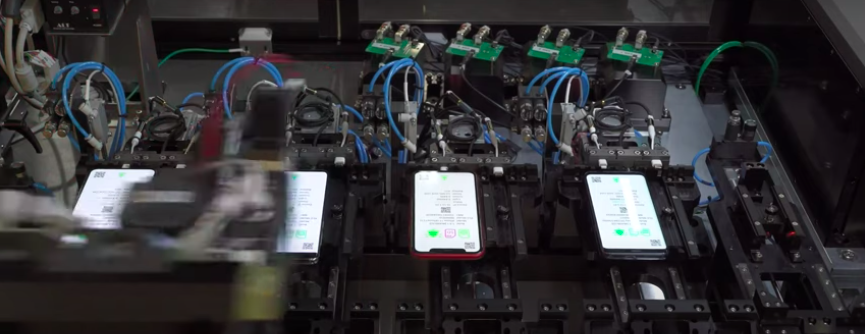Apkudo, a Baltimore-based company focused on supply chain automation for connected devices, raised $14 million in Series B funding as it aims to expand internationally and hire additional team members, said CEO Josh Matthews.
The funding round was led by venture capital firms Birmingham, Alabama-based Harbert Growth Partners and Philadelphia-based MissionOG. The round also saw participation from existing investors based in the D.C.-Maryland-Virginia region: Grotech Ventures, which has an office in Hunt Valley, and McLean, Virginia-based Lavrock Ventures.
Founded in 2011 by Matthews and Ben Leslie, Apkudo developed a platform, called Hive, which is designed to manage and optimize the supply chain for any device with connectivity to a broader network or the internet. It has grown with a focus on smartphones, but the platform can also manage connected devices such as wearables, TVs or others used in the home.
When it comes to smartphones, Matthews said the supply chain includes a network around these devices: Wireless carriers supply network connectivity, software platforms help them run, retailers and insurers are involved in sale and protection, and third-party logistics companies help move them.
They’re all linked as the devices move through phases from design and development to certification with a network operator to launching the device to the many updates or repairs that could be needed once it is in service and potentially to returns or resale.
At any point in that cycle, Matthew said, “What they’re doing is asking the same question over and over again, which is, ‘What do I do with this device right now?'”
Those questions come in whether it’s the manufacturer launching the device, the logistics company shipping it or someone on the insurance side deciding whether it’s worth repairing. Hive seeks to provide data and automate the processes that help answer them, Matthews said.
Part of that work is connecting the different data sources through the platform, and analyzing the history of a device and available software that may provide insights for how it will be used going forward. Another piece is done at Apkudo’s headquarters in Canton, where it has a lab, outfitted with robotics, that performs testing on the devices. It also equipped for “cosmetic grading,” which evaluates physical condition.
For instance, when an equipment manufacturer and carrier are working in the certification phase that’s necessary to launch, they’ll send it to Apkudo’s lab for analysis of the history of previous versions of the device, and testing on how it might fare over time from use, both when it comes to the software that’s cycled through and the physical effects on the hardware. This informs predictions about how it’ll fare through each stage of that life cycle, and the analytics then get shared with each of the companies participating in the supply chain.
The company is working with prominent names in these industries, including AT&T, T-Mobile, Verizon, Samsung, Amazon and FedEx Supply Chain Services. They represent different parts of the supply chain, and each are large companies in and of themselves. Matthews said the key word for the business’ trajectory has been “relationships.”
“We needed to deeply engage with each of them and form the right relationships, where they see the benefit and extend the use of the platform to their trade network and stakeholders,” he said.
Once those relationships were established, Matthews said showing return-on-investment in gathering the data, analyzing it and automating processes was important.
Now, Matthews said the company is squarely in “growth mode.” It is seeking to expand geographically where it works, as well as expanding its work with more types of connected devices. That’ll mean hiring, including expanding its team of about 50 people in Baltimore.
“We’ve got the platform now, from a U.S. perspective in use fully and engaged across the full connected device life cycle, with every stage of that life cycle,” he said. “We’re now entering global expansion.”
Developing over a decade, Matthews said the company has taken the approach of “controlled growth” where “at all points we made sure our market engagement has been really successful.” And throughout, Matthews said, “Our vision hasn’t changed at all since day one.”







